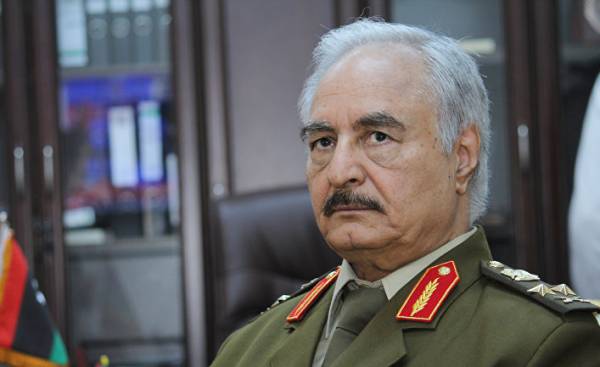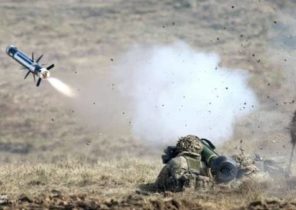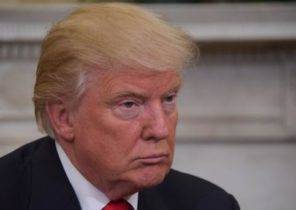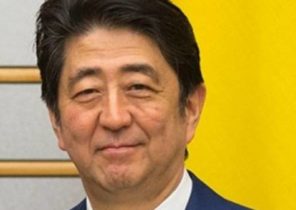
The man Vladimir Putin is betting in Libya, he has served many masters. Has received military education in the Soviet Union, Khalifa Haftar (Khalifa Haftar) in 1969, being then a young officer, he supported the coup of Muammar Gaddafi (Muammar al-Gaddafi) against king Idris and was elevated to the post of chief of the General staff of the revolutionary leader. After the Haftarot during the border conflict with Chad, was captured, he in the late eighties, fell out of favor with the dictator.
The United States provided him refuge and supported in 1996, led by the Haftarot of the uprising against Gaddafi, which, however, was quickly crushed. The General returned to his house near the main CIA office near Washington. The Libyan land he went out again only once, in 2011, Gaddafi was overthrown.
Meanwhile, the Haftarot, has marked 73 years. And despite his advanced age, he is currently the most powerful man in Libya. He heads the Libyan national army, which consists mainly of the remnants of Gaddafi’s army. As the Haftarot, many commanders was once the military education in the Soviet Union and, accordingly, have good connections in Moscow.
Haftar refuses to submit to the government
Haftar is at the head of the army, however, refused to recognize the government of Prime Minister Fayeza Saraga (Fayez Sarraj) in Tripoli. The German head of the UN mission in Libya, Martin Kobler (Martin Kobler) after which lasted for several months of negotiations in late 2015 contributed to the formation of a unity government, which represented a rival militias and warlords. But Haftar stubbornly refuses to subordinate to the control of the government troops, which own almost half the country. Meanwhile, he appointed himself field Marshal.
According to rumors, during a meeting in Cairo in February, Prime Minister Sarraj, even proposed to the General post of defense Minister, however, Haftar has refused. Have Saraga and his patrons no military and economic means in order to force the head of the army to obey.
Haftar knows that he has significant support: Egyptian President Abdel Fattah al-Sisi (Abdel Fattah el-Sisi) and, more importantly, the head of Russia Vladimir Putin. The Kremlin feels the chance of using the Haftarot to change in their favor the balance of power in another country, the “Arab spring”.
In Syria, the Russian military intervention while guaranteed the survival of the Assad regime. The army of Egypt for the first time since the end of the era of Nasser in the early seventies again conduct joint maneuvers with the Russian army, and now with the Haftarot in the East of Libya is ruled by people, who also focuses on Russia.
Russian aircraft carrier
And Moscow has made it clear that Haftar is the man to whom Russia is doing in Libya, bet. The Ministers of defence and foreign Affairs over the past months has taken a General in the Russian capital a week ago, one of his messengers, was at the talks in Moscow. When in January the aircraft carrier “Admiral Kuznetsov” during the return from the Mediterranean sea off the coast of Syria docked at the Libyan port of Tobruk, the Russian army welcomed the Haftarot on the ship.
General needs first and foremost to promote Russian economic interests in Libya. Gaddafi in the last years before his overthrow signed a major military contracts with Moscow. According to the government service which is responsible for arms exports, Russia due to the overthrow of dictator lost contracts worth at least four billion U.S. dollars. In 2010, the year of the uprising against Gaddafi, Libya was still the second largest buyer of Russian weapons.
Haftarah had to promise to partially restore Gaddafi signed contracts to buy Russian weapons in the amount of two billion US dollars. The Kremlin denies the existence of such negotiations — in part because that arms exports to Libya due to the still existing embargo the UN would be illegal. General for several months requires the lifting of an arms embargo.
Russian mercenaries in Benghazi
Haftar could pay with oil and gas exports. His troops control almost all the important places of oil production and ports in the East of the country. Since then, oil production has more than doubled from 300 million barrels to 700 thousand barrels per day. In February, the head of the Russian oil giant and Putin confidant Igor Sechin together with the head of the Libyan oil company Synalloy Mustafa (Mustafa Sanalla) signed an agreement on cooperation in oil extraction and exploration of new fields.
This agreement is of great importance, because Russia thus gets the opportunity “to restore economic and other relations, which were severed in overthrowing Gaddafi,” wrote “Nezavisimaya Gazeta” of Moscow.
Long ago posted in Libya and the Russian mercenaries. Oleg Cenestin, the head of a private military enterprise RSB confirmed that his employees are in the vicinity of Benghazi. According to official data to clear from mines and refineries to protect oil tankers from pirates.
Alarm from Malta
Moscow has denied that Russian regular troops are involved on the side of the Haftarot. Equally strongly, the Ministry of defense denied information about the location of forces on the Egyptian military base close to the Libyan border. In view of Russian activity in Syria, the experts from Moscow considered part of the ground troops in the Libyan conflict implausible.
However, Russia already uses a vacuum that the West has left Libya. In any case, for Donald trump, this country, it seems, plays a secondary role. The EU is looking at Libya with concern primarily because of the thousands of refugees that continue to arrive in the Mediterranean sea to Italy. Federal Chancellor Angela Merkel (Angela Merkel) and other heads of state and government are banking on the fact that the transitional government will prevent the departure of boats with refugees. However, large parts of the coast are controlled not by government but by General Haftarot.
Malta, an EU country closest to Libya, with particular concern the developments in that country. Foreign Minister George Vella (George Vella) in the past few weeks repeatedly warned of the scenario according to which Russia and its allies will decide on how many refugees will sail from Libya towards the EU.







